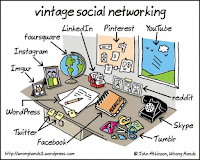Connecting Is Not the Same as Conversing
What is the relationship between Turkle and Wesch? Do you see them as allies, or opponents in this discussion of new media and technology?
I sit here, chuckling a little bit because as I was reading these two articles, I found myself thinking, "What do these have to do with each other at all? Turkle is talking about constant connectivity through technology that leads to a disconnect and lack of communication in real life while Wesch is discussing how educators need to find true ways for their students become engaged in learning. How are they relatable?"

But as I continued to think on the topic and the underlying themes between the two articles, I found myself seeing that these needs for connectivity and conversations arise from both authors. While Turkle continuously noted that "we are together, but each of us is in our own bubble, furiously connected to keyboards and tiny touch screens," I could not help but think of how Wesch's students must be in his class when asked if they had any questions and they surface with the basic "what do I need to get by" questions. If students continue to view their learning as "simple information gathering, built to effectively carry out the relatively simple task of conveying information," there was no need for them to try and dive deeper into asking another question that would force them to think, analyze, and connect all the pieces of information that they have. While I do not think this is a result of the heightened presence of technology and constant connectivity in our classrooms (and lives), it is important for us as educators to teach students how they can be a part "in creating a meaningful learning environment to harness and bring significance back into the classroom."
First, though, they must look beyond what is portrayed on the screens because, with all this technology, individuals "present the self [they] want. This means we can edit. And if we wish to, we can delete. Or retouch: the voice, the flesh, the face, the body. Not too much, not too little-- just right" (Turkle). Technology allows us to "gather discrete bits of information" and "connect in sips" (Turkle) and unfortunately, we do not see the "meaningful narrative that has been emerging all around us over the past several decades" because "it is rarely named and therefore not often noticed" (Wesch). Even though people have an immense amount of technology at our disposal and can access the information at any hour and anywhere, people are seldom stopping to ponder on the soundbites of information they are producing or consuming. People, not just children, are not as "digitally literate" as they like to think they are, and this is something that needs to be explicitly taught to everyone so that those deeper connecting conversations can occur (Boyd).
This, I feel, is the thread that connects Turkle and Wesch in their arguments: the need to stop and connect with each other, to make the information relatable to their experiences on a real level. As Turkle highlighted, "social media continually asks us what's 'on our mind,' but we have little motivation to say something truly self-reflective" because "self-reflection in conversation requires trust." This is a similar notion that Wesch (and educators across the board) experiences when there is space for students to ask questions and almost immediately they emerge with "administrative questions" ("what's on our mind" as Turkle would say). There is limited trust in the classrooms because education has been established to determine a "right and a wrong answer rather than "encouraging students to join [the educator] on the quest" for knowledge. It is hard for students and people everywhere in this current society to change their way of thinking when we, over time, have been programmed that this is the "right way" to respond and 'think.'
Turkle and Wesch are desiring for us to connect, albeit in different ways, but connect in a true sense. The ability to connect and converse with someone in person provides us with a chance to understand and know one another and ourselves (Turkle), and these beginning stages of sitting with another person to piece together information and truly begin to understand how they are in the subtle tones and expressions observed while conversing (and not because you get a flashing status declaring how they are) is a skill that will help us be able to "figure out how the world works" and understand that "beyond our own provincial grand narratives we are all interconnected,...that our future depends on us and future generations" (Wesch).
But it needs to be taught. It is not innate or natural given the society that we live in, and I think Turkle and Wesch could learn quite a bit from Danah Boyd about the responsibility we all have to teach others how to become "digitally literate" and make meaning out of everything we are consuming and producing. The first step is accepting there's a problem; the second is to agree to be the agent of change that shakes things up rather than just sitting to the side and letting the problem fester. Everyone needs to "recognize their own importance in helping to shape the future", whether that's in the classroom with how they learn or in life when "connecting" and conversing with another individual.





I think your point about first accepting that there is a problem and then doing something to work towards making it better is so important. I feel that the longer we keep moving forward without making any ripples in the water, the safer and more complacent we begin to feel. And I am not sure that being complacent is a good place to be.
ReplyDeleteI found the same point of connection between the authors and enjoyed the depth of your commentary.
ReplyDelete